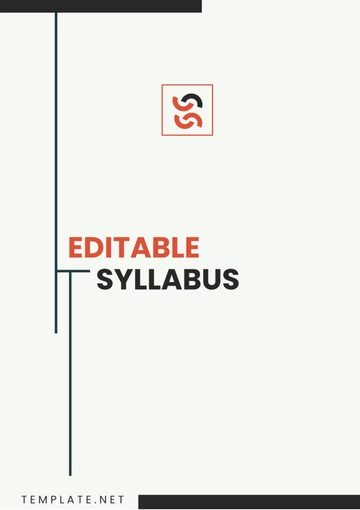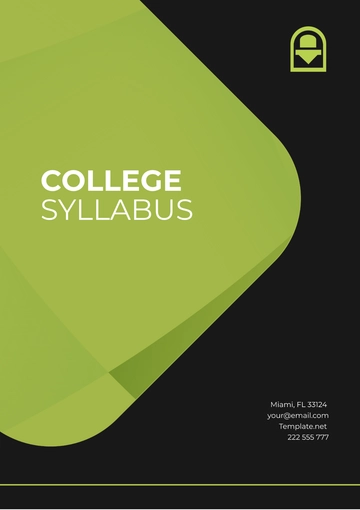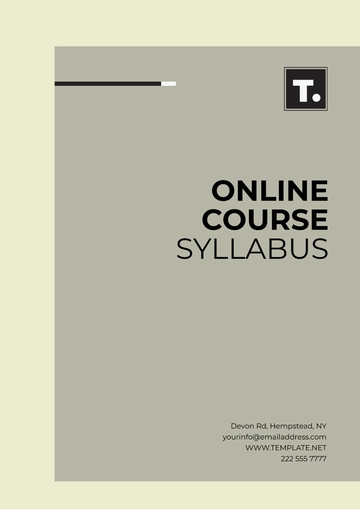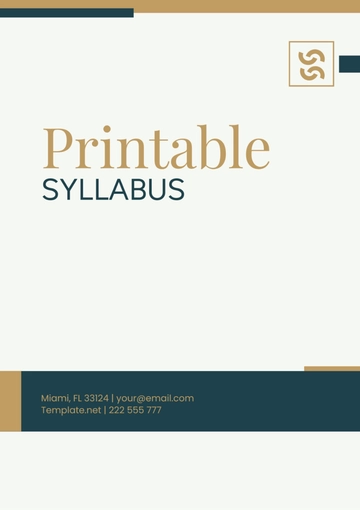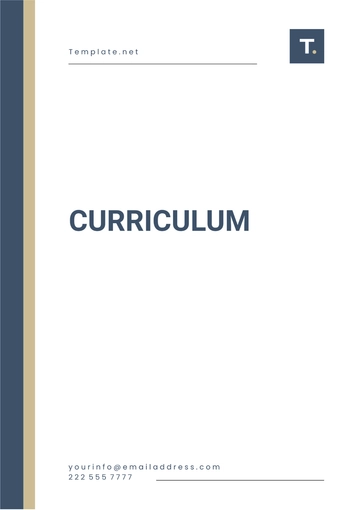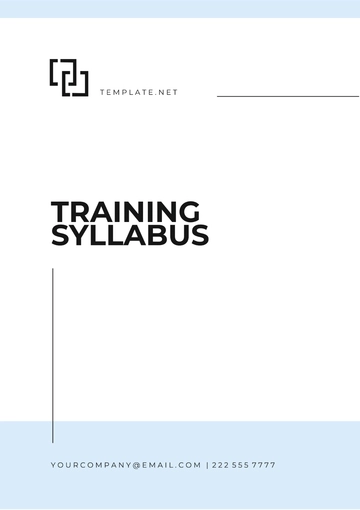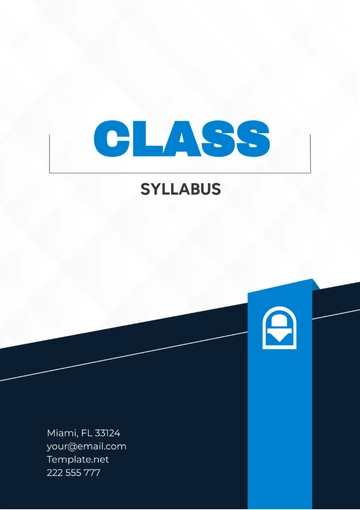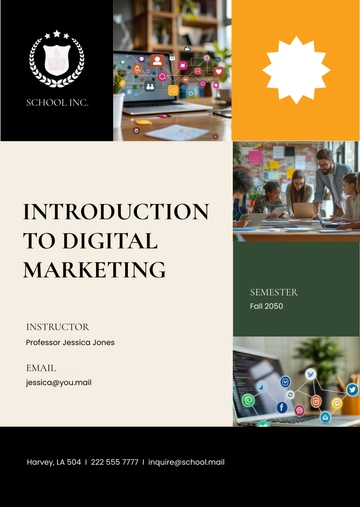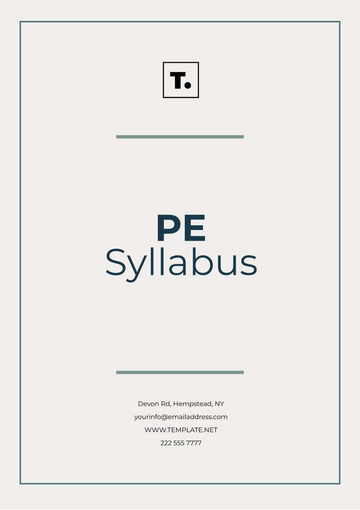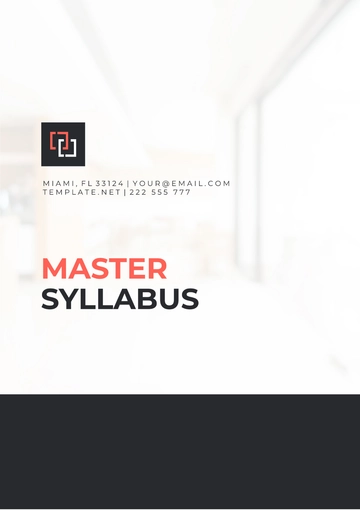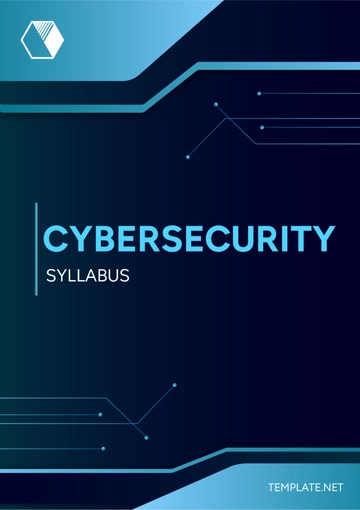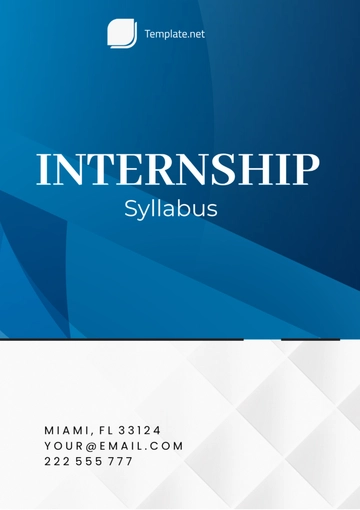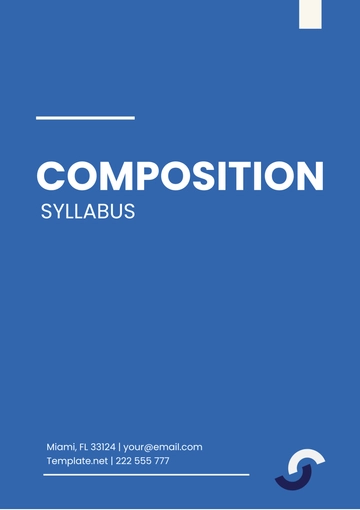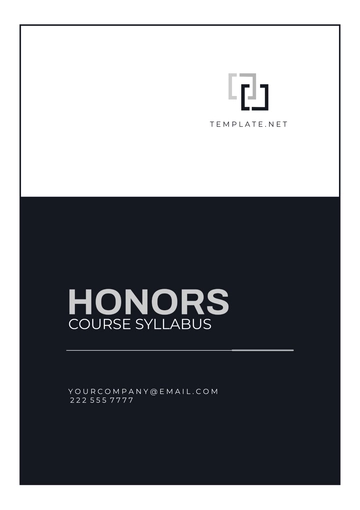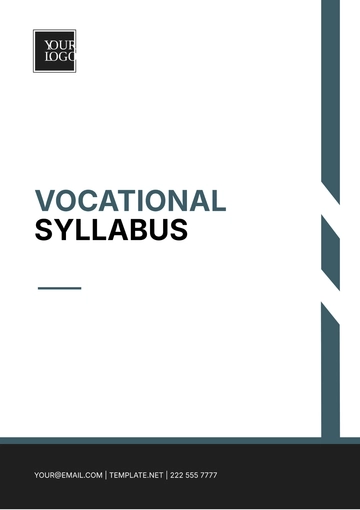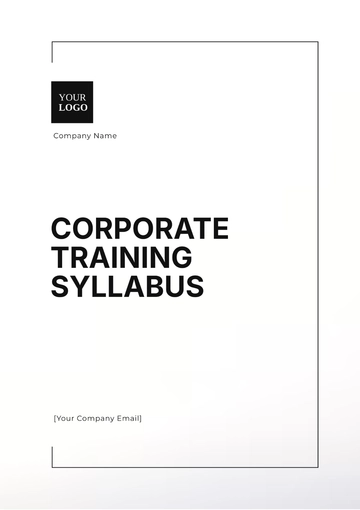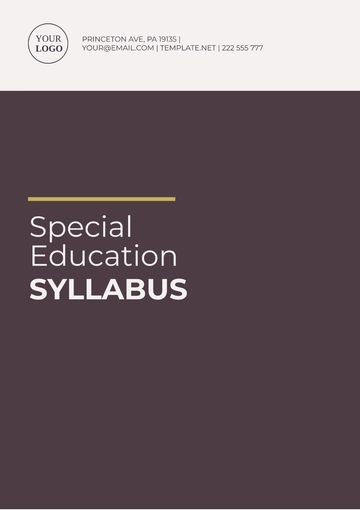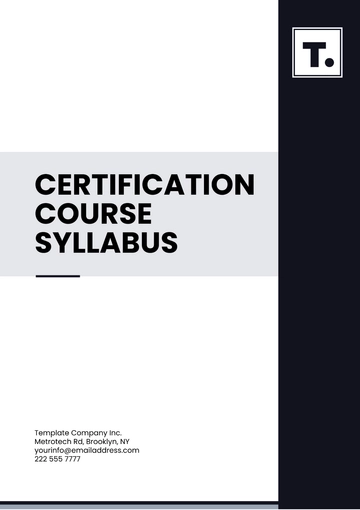Free Business Syllabus
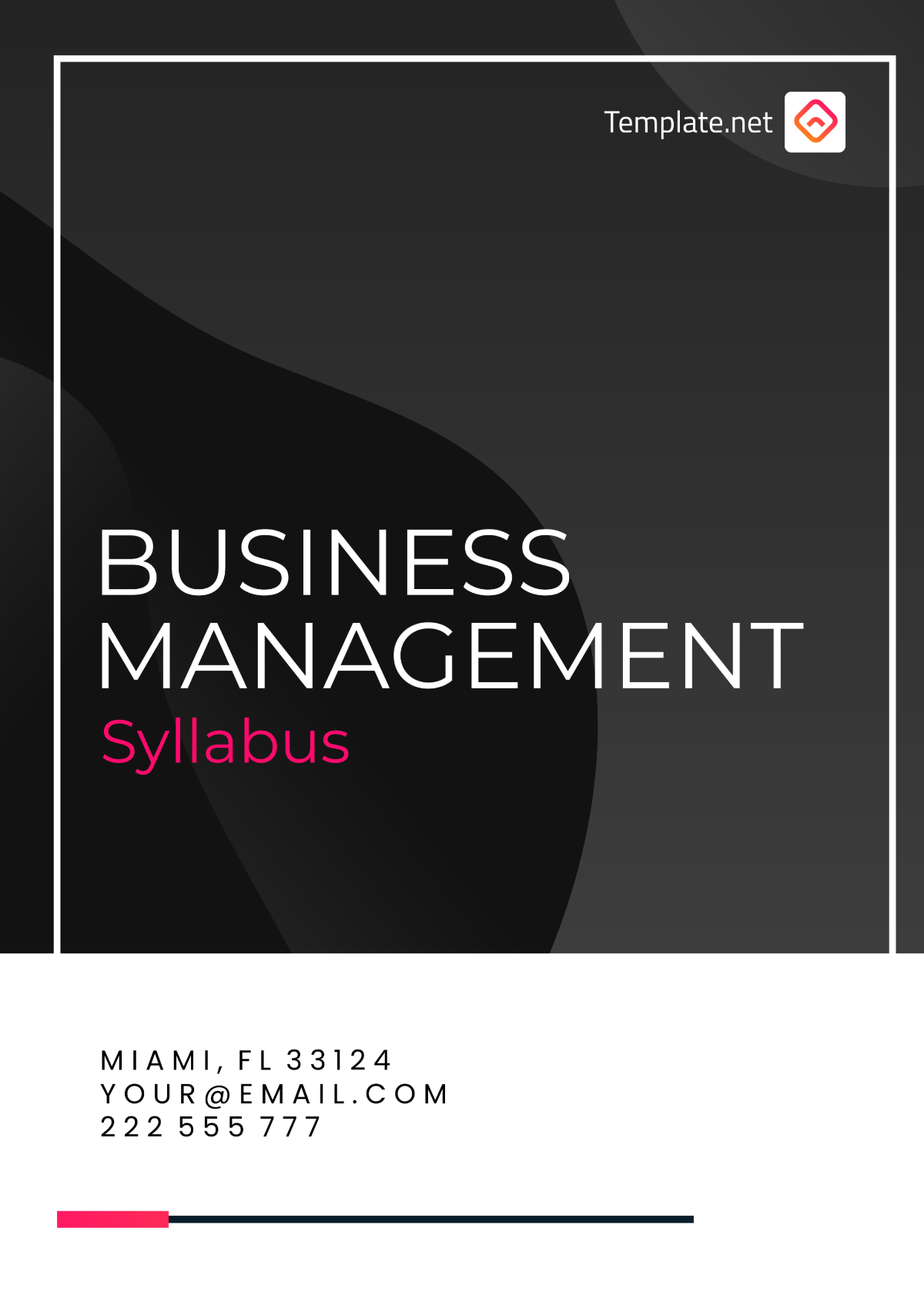
Business Management Course
School Year | [SCHOOL YEAR] |
Course Code | [COURSE CODE] |
Instructor Name | [YOUR NAME] |
[YOUR EMAIL] | |
Office Hours | [OFFICE HOURS] |
Class Location | [CLASS LOCATION] |
Class Time | [CLASS TIME] |
Class Duration | [DATE] - [DATE] |
I. Course Description
This course offers students a deep dive into the dynamic field of business management, providing a robust foundation in essential principles and practices crucial for success in modern organizational settings.
Through engaging lectures, interactive discussions, and practical applications, students will explore a wide range of topics essential to effective management, including organizational structure, leadership theories and styles, strategic decision-making processes, communication strategies, and the development of sustainable strategic plans.
Emphasis will be placed on understanding the interconnectedness of these concepts and their real-world applications in diverse business environments. Students will also have the opportunity to analyze case studies, engage in group projects, and participate in experiential learning activities designed to enhance critical thinking, problem-solving skills, and leadership abilities.
By the end of the course, students will emerge with a comprehensive understanding of business management principles and the confidence to navigate complex organizational challenges with agility and insight.
II. Instructor Information
Instructor: [YOUR NAME]
Email: [YOUR EMAIL]
Office Hours: [SPECIFY OFFICE HOURS]
III. Learning Objectives
Understand key concepts and theories in business management.
Develop critical thinking and problem-solving skills relevant to business contexts.
Enhance communication and interpersonal skills necessary for effective leadership.
Analyze case studies to apply theoretical knowledge to real-world scenarios.
Formulate strategies for organizational development and growth.
IV. Course Schedule
Week | Topic | Readings |
|---|---|---|
1 | Introduction to Management | Chapters 1-2 |
2 | Organizational Structure | Chapters 3-4 |
3 | Leadership | Chapters 5-6 |
4 | Decision Making | Chapters 7-8 |
5 | Communication | Chapters 9-10 |
6 | Strategic Planning | Chapters 11-12 |
7 | Case Study Analysis | Case Studies 1-3 |
8 | Midterm Exam Review | Review Materials |
9 | Organizational Development | Chapters 13-14 |
10 | Team Dynamics | Chapters 15-16 |
11 | Conflict Resolution | Chapters 17-18 |
12 | Project Management | Chapters 19-20 |
13 | Ethical Considerations | Chapters 21-22 |
14 | Strategic Decision-Making | Chapters 23-24 |
15 | Course Review and Final Exam | Review Materials |
V. Required Reading and Materials:
Title | Author |
|---|---|
Management: A Practical Introduction | Angelo Kinicki and Brian Williams |
Harvard Business Review articles | (provided by Instructor) |
Case study materials | (provided by Instructor) |
Access to course website for additional resources | (provided by Instructor) |
VI. Assignments and Assessments:
Assignment | Due Date |
|---|---|
Weekly quizzes to assess understanding of readings and lectures | [DUE DATE] |
Case study analyses to apply concepts learned in class | [DUE DATE] |
Group projects to develop teamwork and communication skills | [DUE DATE] |
Midterm exam covering material from the first half of the course | [DUE DATE] |
Final exam assessing overall comprehension of course content | [DUE DATE] |
VII. Course Policies:
Attendance and participation are crucial for success; frequent absences may affect grades.
Assignments are due at the beginning of class on the specified dates.
Late submissions will incur a penalty of 10% deduction per day.
Plagiarism or cheating will result in a zero for the assignment and may lead to further disciplinary action.
Respectful behavior towards classmates and the instructor is expected at all times.
VIII. Grading Policy:
Criteria | Percentage |
|---|---|
Weekly Quizzes | 20% |
Case Study Analyses | 20% |
Group Projects | 20% |
Midterm Exam | 20% |
Final Exam | 20% |
Total | 100% |
IX. Additional Resources:
Online forums for discussion and collaboration.
Recommended supplementary readings for deeper understanding.
Guest lectures from industry professionals.
Career development workshops and resources.
X. Academic Integrity
Maintaining academic integrity is essential to the learning process and the reputation of the institution. Students are expected to uphold the highest standards of honesty and integrity in all aspects of their academic work. This includes properly citing sources, completing assignments independently unless otherwise instructed, and refraining from any form of cheating or plagiarism.
Violations of academic integrity will be taken seriously and may result in penalties such as failing the assignment, failing the course, or disciplinary action by the university.
XI. Accommodations for Students with Disabilities
Students with disabilities are valued members of our learning community, and every effort will be made to ensure equal access to course materials and activities. To request accommodations, students are encouraged to contact the instructor as early as possible in the semester to discuss their needs.
Accommodations will be provided in accordance with university policies and applicable laws, such as the Americans with Disabilities Act (ADA) and Section 504 of the Rehabilitation Act. Examples of accommodations may include extended time on exams, note-taking assistance, or alternative formats for course materials. All discussions and documentation related to accommodations will be kept confidential.
XII. Communication Guidelines
Effective communication is essential for success in this course. All official course communications will be sent via email and posted on the course website. It is the responsibility of students to check their university email regularly for announcements, updates, and reminders.
In addition to email, students are encouraged to actively participate in class discussions, ask questions, and seek clarification when needed. The instructor will strive to respond to emails and inquiries in a timely manner, typically within 24-48 hours during regular business hours. If students encounter any issues or have difficulty accessing course materials, they should promptly notify the instructor for assistance.
XIII. Course Evaluation
Your feedback is crucial for continuous improvement and enhancing the learning experience for future students. At the end of the semester, you will have the opportunity to provide feedback on various aspects of the course, including the course structure, content, teaching methods, and instructor performance.
Your feedback is anonymous and will be used to assess the effectiveness of the course and make necessary adjustments for future offerings. Additionally, throughout the semester, students are encouraged to engage in open dialogue with the instructor regarding any concerns or suggestions for improvement. Your input is highly valued and appreciated.
Disclaimer
While every effort has been made to provide accurate and up-to-date information in this syllabus, the instructor reserves the right to make changes as necessary to accommodate the needs of the class and to enhance the learning experience.
Any modifications to the syllabus, including changes to assignments, due dates, or course policies, will be communicated to students in a timely manner. It is the responsibility of students to regularly review the course materials and stay informed of any updates or changes. By enrolling in this course, students acknowledge and accept the possibility of revisions to the syllabus and agree to abide by all course policies and requirements.
- 100% Customizable, free editor
- Access 1 Million+ Templates, photo’s & graphics
- Download or share as a template
- Click and replace photos, graphics, text, backgrounds
- Resize, crop, AI write & more
- Access advanced editor

